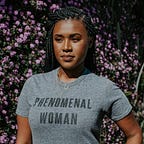The Privilege of Hair
I imagine that many of you who are reading this have never had to worry about your hair before heading to school or work. And no, I’m not talking about a ‘bad hair day’. I’m talking about the stress and anxiety that comes along with the judgement and ridicule of your natural, God-given hair.
For many people of color, hair has been the center of conversation for decades. Don’t believe me? Here are some quick facts:
- Black women are 1.5x more likely to be sent home from the workplace because of their hair
- Black women are 80% more likely than white women to agree with this statement: I have to change my hair from its natural state to fit in at the office
I can remember being 9 years old when I got my first relaxer. At the time, I was so proud about this defining moment. Unable to see it for what it was (a chemical process meant to damage the natural hair follicles I was born with), I was excited to look more like my friends at school and get rid of my ‘otherness’. As ludicrous as it might sound, I truly thought this process would make me fit in. After all, what child wants to be singled out from his or her friends?
I sat in the chair as my hairdresser applied the cold chemical on my scalp. “Let me know if it starts to burn and we will wash it out,” he said. “Ok,” I replied, knowing good and well I was going to leave that relaxer in my hair for as long as I possibly could.
Minutes later, the tingling in my scalp turned to discomfort but I talked myself out of it. I wanted bone-straight hair. Minutes that felt like hours soon passed and we washed it out. As I sat in the shampoo bowl, I looked up at my hairstylist to see if he looked satisfied with how straight my hair was.
Over the next 10 years, I repeated the same process every 4–6 weeks to ensure my hair was as straight as it could be at all times. It wasn’t until I got to Hampton University, a historically black college in Hampton, Virginia, where I met other young black women who had natural hair. Yes, that was the first time that I met young women who looked like me and maintained their natural hair. I was stunned. During my freshman year of college, I decided to stop chemically altering my hair and began my natural journey again.
Four years later when I graduated and entered the work world, I started to have those feelings of ‘otherness’ that I felt when I was 9 years old sitting at the hair salon. My natural hair made me stand out from my colleagues and feelings of insecurity crept back in. Living in New York City, I had access to the worlds most talented (read: expensive) stylists in the world and they had just the solution. Every couple of weeks I would spend $500 — $800 on extension installations. Again, altering my natural look to avoid standing out.
Even now as I am well into my career, I often think about my hair. In my 30s, I’ve reached a new level of self love and I fully embrace my hair but I know that some people in this world will not.
I spend an embarrassing amount of time wondering if my colleagues will see and understand the beauty of my tresses. Sometimes I find myself trying to narrate what might be going through their minds as I, one (of very few) black women in the room, sit at the table unforgivingly with luscious coils. Will they see my natural hair as an open invitation to touch it? Will they whisper loudly, “is your hair real”? Will someone question the professionalism of my natural-born locks?
Friends, colleagues and allies: When was the last time you were told that your heritage was unprofessional? I hope you understand that this is not just about hair. This is about race. Currently there are 43 states in the United States where it is lawful to discriminate against a person in the workplace or in schools because of their natural or protective hairstyle.
In honor of Natural Crown Day on July 3, 2020, I hope you’ll join me in signing The Crown Act Petition to shatter racial hair discrimination by signing this petition to urge legislators to vote YES on The CROWN Act to ensure that Black women, men and children can wear their natural hair boldly and proudly, without the fear of being discriminated against in school or the workplace.
Helpful Resources:
- Student Athlete, Andrew Johnson, had his locks cut so he could compete in a wrestling match
- Teacher writes a note asking Black mom to not use coconut oil on daughter’s hair because it ‘stinks’
- Student sent home for wearing braids
- First grader sent home from school for wearing dreadlocks
- Journalist fired for wearing natural hair
- Wearing natural hair in corporate America
